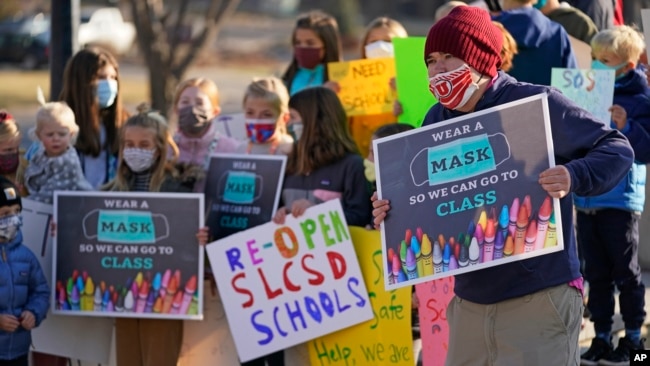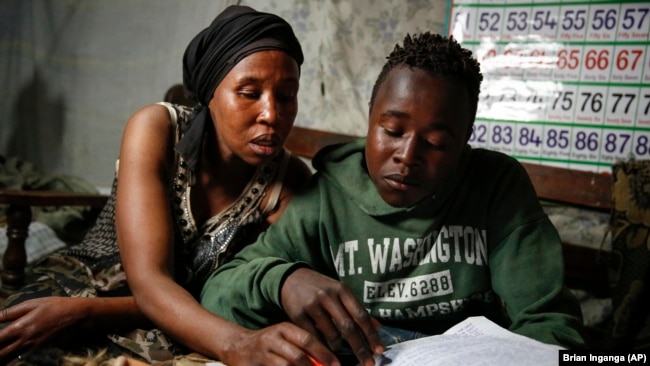私たちは、歴史の目撃者である。
まさにそう感じた2020でした。
必ずや後世の教科書に載る出来事がまさに今起こっているのです。
現代史に類を見ない悲劇的な年として。
いかに歴史が作られるか、歴史とは何か、歴史哲学に興味を持つ私には、どの情報でこの物語が綴られるのか、とても関心の高いところです。
IT時代とコロナによるこれからの教育は、今後どのように変貌していくのでしょうか。
パソコン1台あれば、英語を理解できれば、海外の大学ででも、学位がとれる時代です。まさに私も改めて勉強し直したいと入学要綱を読んでいたところでした。
まさにITを制するものが地球を、いえ宇宙を制する時代に生きる私たち。
学校教育の重大さとその格差を考えさせられた年でした。
今日のVOA、英語と共に世界を見ましょう!!!
2020年は教師と学習者にとって困難な年だった
2020 Was a Difficult Year for Teachers and Learners
December 26, 2020
2020年の初めには アメリカの学校やカレッジが直面している問題には 奴隷制度、学校での銃撃、性的暴行、テクノロジーの利用などの問題が含まれていました。
それが3月にすべて変わったのです。
コロナウイルスの大流行により、生徒や教師は家に帰らざるを得なくなり、米国をはじめ世界中の学校はオンラインでの教室移動を余儀なくされたのです。
アーシャ・チョクシ氏は、ピアソン・エデュケーション社のリサーチ部門の責任者です。彼女は、オンライン学習への移行を高等教育を改善するチャンスだと考えています。「その結果、どのように、いつ、どこで、学習するかという点で、実際に学生に多くの権限が与えられました」と彼女は言います。
しかし、政策研究グループThe Century Foundationのステファニー・ホール氏は、医療や教育のような分野では、オンライン教育が対面での学習に取って代わることは決してないと主張しています。
ホール氏は、「学生は経験が必要なのですよ、それは教室で学んでいること、読んでいること、聞いていることの体験です。そして、テクノロジーがどの程度までそれを容易にすることができるかはまだわかりません。」
健康危機はまた、留学生が米国に滞在することを困難にしました。そして、米国の学生が他の国で勉強することもできなくなりました。
ブライアン・アレクサンダー氏は、ジョージタウン大学の教授です。彼は、この経験をきっかけに、より多くの大学がオンライン教育を開発するようになる可能性があると述べています。しかし彼は、学生が”オンラインでの経験が乏しかったり、コロナウイルスもちょうど別のインフルエンザ種に衰退する場合には”、それは実現しないかもしれないと警告しています。
農村部や恵まれない学生にとっての苦難
年が経つにつれ、低所得者層のコミュニティや地方の学生にはオンライン教育のための設備が整っていないことが明らかになりました。
フィラデルフィア市の学生のうち、コンピュータと自宅でのインターネットサービスを持っているのは半数にすぎませんでした。時間はかかりましたが、ようやく役人や企業が機器やサービスを提供するために介入してきました。インターネットサービスのないサウスカロライナ州の農村部では、州は支援のためにwi-fiインターネットを装備したバスを送りました。
世界中の学生が同様の問題に直面していました。
ユネスコは4月、世界の学習者のうち通信教育に参加できるのは半数にすぎないと報告しました。バングラデシュやアフガニスタンのような場所では、電気やインターネットサービスがないため、学生は自宅で勉強を続けることができませんでした。
スリランカ、コロンビア、エクアドル、チリ、ハイチなどの多くの国では、ラジオやテレビ放送を利用して、自宅で学習する学生に教育を提供していました。
ダイアナ・ロペスさんは、1万人の公立学校の生徒がいるボゴタ近郊の町フンザで教師をしています。彼女は、「ラジオの授業は、子どもたちに読み書きのスキルを伸ばす場所を与え、また、教師は今もずっと子どもたちと一緒にいることを示すのです 」と述べています。
しかし、教育者たちは、学校に出席できず、友人にも会えない学生の精神的な健康を心配しています。
フランク・チェン氏は、大学時代の若い成人と一緒に仕事をしてきた精神科医です。彼は、大学は、仕事、勉強、個人的な人間関係のバランスをとるため、精神衛生上の問題の有無にかかわらず、学生にとって難しい経験になる可能性があると述べています。パンデミックのような大きな出来事が、長期的な心理的な影響があるかもしれないことを予測することを非常に困難しています。
「今生きている人たちの歴史の中で、これに匹敵するような出来事は他にないと思います 。」とチェン氏は言います。
バージニア州では、5年生の教師のアイリーン-ワッツさんは、彼女と他の教師が生徒の不安を軽減するための活動に取り組んでいると言います。授業を中断してゲームをしたり、ダンスをしたりする”ブレーンブレイク”を行いました。また、子供が不安を感じている場合は、誰かとパートナーを組むことで感情を落ち着かせることができます。
教室に戻る
8月には、米国の学校を再開すべきかどうかについて、保護者、教師、政治家が議論しました。一方、ヨーロッパ、韓国、ベトナムなど、パンデミックがよりコントロールされていた国の学校は、無事に再開することができました。
米国の学校が再開したことで、教師の死亡や子どもたちのCOVID-19への感染という悲劇的な結果になりました。ミシシッピ州では、9月中旬までに学校の教職員の間で604人が感染しました。
ランディ・ワインガーテン氏は、米国教師連盟の会長です。彼女は、「ミズーリ州やミシシッピ州のようにコミュニティの広がりがあまりにも大きい場合、検査のインフラが整ってない場合、学校内でのウイルスの拡散を防ぐセーフガードが整っていない場合は、対面での再開はできないと考えています。」 と述べました。
2020 Was a Difficult Year for Teachers and Learners
 FILE - Students who attend Salt Lake City School District schools rally at East High School Monday, Dec. 7, 2020, in Salt Lake City, urging the school board and administrators to restart in-person learning. (AP Photo/Rick Bowmer)
FILE - Students who attend Salt Lake City School District schools rally at East High School Monday, Dec. 7, 2020, in Salt Lake City, urging the school board and administrators to restart in-person learning. (AP Photo/Rick Bowmer)
At the beginning of 2020, the problems faced by American schools and colleges included issues like slavery, school shooting, sexual assault and the use of technology.
That all changed in March.
The coronavirus pandemic sent students and teachers home, forcing schools in the U.S. and around the world to move classrooms online.
Asha Choksi is head of research for Pearson Education. She saw the move to online learning as a chance to improve higher education. “What it’s done is, it’s actually given a lot more power to students in terms of how, when and where they learn,” she said.
However, Stephanie Hall of the policy research group The Century Foundation argued that online education can never really replace in-person learning in fields like healthcare and teaching.
Hall said, “Students need to experience…what it is they’re learning about, reading about or hearing about in the classroom. And I don’t know yet the degree to which technology can facilitate that.”
The health crisis also made it difficult for international students to stay in the United States. And it prevented U.S. students from studying in other countries.
Bryan Alexander is a professor at Georgetown University. He said the experience could push more colleges to develop online education. He warned, however, that might not happen if students have “poor online experiences, or if the coronavirus fades into being just another flu strain.”
Hardship for rural and disadvantaged students
As the year went on, it became clear that low-income communities and students in rural areas were not equipped for online education.
Only half of the students in the city of Philadelphia had computers and home internet service. It took some time but officials and businesses finally stepped in to provide equipment and service. In rural areas of South Carolina without internet service, the state sent buses equipped with wi-fi internet to help.
Students around the world faced similar problems.
UNESCO reported in April that only half of the world’s learners could take part in distance learning. In places like Bangladesh and Afghanistan, lack of electricity and internet service kept students from continuing their studies at home.
Many countries, including Sri Lanka, Columbia, Ecuador, Chile and Haiti used radio and television broadcasts to provide education for at-home students.
Diana Lopez is a teacher in Funza, a town near Bogota with 10,000 public school students. She said, “The radio lessons give children a space to develop their reading and writing skills and also show them that their teachers are still with them.”
Mental health and pandemic effects
Educators, however, worried about the mental health of students who could not attend school or see their friends.
Frank Chen is a psychiatrist who has worked with college-age young adults. He said college can be a difficult experience for students with or without mental health issues, as they balance work, studies and personal relationships. A major event like the pandemic makes it very difficult to predict what the long-term psychological effects might be.
“I don’t think that there’s another event in the history of the people who are alive now that can really measure up to this,” said Chen.
In the state of Virginia, fifth-grade teacher Aileen Watts said she and other teachers built in activities to help students reduce anxiety. Classes took “brain breaks,” which meant stopping the lesson to play a short game or even do a dance. And, if a child was feeling anxious, he or she could partner with someone to help calm those emotions.
Back into the classroom
In August, parents, teachers and politicians debated on whether U.S. schools should reopen. Meanwhile schools in countries where the pandemic was under more control, such as in Europe, South Korea and Vietnam, were able to reopen successfully.
As U.S. schools reopened, the tragic result was the death of teachers and infection of children with COVID-19. In the state of Mississippi, there were 604 cases among school teachers and workers by mid-September.
Randi Weingarten is president of the American Federation of Teachers. She said, “If community spread is too high, as it is in Missouri and Mississippi, if you don’t have the infrastructure of testing, and if you don’t have the safeguards that prevent the spread of viruses in the school, we believe that you cannot reopen in person.”
___________________________________________________________
Words in This Story
facilitate – v. to make something easier
fade – v. to lose force or strength
strain – n. a specific kind of closely related living things including germs
psychological – adj. of or relating to the mind
anxiety - n. fear or nervousness about what might happen
infrastructure - n. the basic equipment and structures (such as roads and bridges) that are needed for a country, region, or organization to function properly
